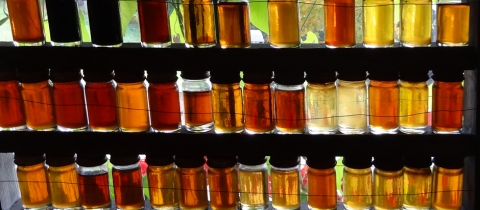When you eat fresh peanuts, you crack the shell and strip the nuts of the thin reddish inner skin that surrounds them. Who would have ever thought that examining the chemistry of this skin would lead to a popular dietary supplement? In 1947 Jacques Masquelier in France, as part of a PhD thesis, investigated the possible toxicity of the peanut membrane and found no chemicals of concern. He did, however find a mixture of compounds with the foreboding name of oligomeric proanthocyanidins which had an interesting biological effect. In the laboratory these compounds made blood vessels suppler. Masquelier eventually coined the term "pycnogenol" for the mix of these substances and found that they were abundantly present in the bark of certain pine trees. Further laboratory investigations revealed that pycnogenol had powerful antioxidant properties, meaning that it was extremely adept at scavenging free radicals, those rogue substances that have been linked with all sorts of diseases. This was all the health food industry needed to launch pycnogenol as a dietary supplement. It didn't take long before miraculous claims appeared. Pycnogenol, it was said, enhanced the immune system and offer protection against allergies, cancer, diabetes and heart disease. It also supposedly slowed the aging process. Making claims is easy; the difficulty comes in supporting them with scientific evidence.
There is no question that "in vitro," meaning in laboratory, pycnogenol exhibits some interesting effects. It can certainly scavenge free radicals in the test tube, but there are hordes of compounds that can do that. It can reduce damage to arteries due to cholesterol buildup, it can reduce the risk of blood clot formation and it can protect cells from some of the damage that ensues when unsaturated fats react with oxygen. Again, this is not something to get too excited about because there are all kinds of food components that will perform such spectacular feats in the lab The question is what happens "in vivo," that is in a living body? Not many controlled blinded trials have been performed in humans. But there have been some that warrant some optimism. Asthmatics, for example, have shown improvement in their symptoms and women in the third trimester of pregnancy were able to reduce back pain, joint pain and cramps in the legs with a daily dose of 30 mg. The risk of deep vein thrombosis on long flights can be reduced by taking pycnogenol. Other studies have linked pycnogenol with better blood pressure control and an improvement of vision problems associated with diabetes. It is well known that in smokers' blood platelets aggregate more readily, that is, blood clot formation is more likely. In one experiment a dose of 200 mg of pycnogenol inhibited this type of platelet aggregation. In an other, there was some improvement in erectile dysfunction in men treated with a mix of arginine and pycnogenol. Certainly intriguing stuff. But I suspect the question most people would like to have answered is whether or not taking a daily supplement of pycnogenol is worthwhile. Unfortunately no study has examined the long term effects of healthy people taking pycnogenol. And I suspect the health food industry is not going to sponsor any such studies, because after all, many people already plunk down their money for pycnogenol, based on the small dose of limited evidence and a large dose of hype and hope.






